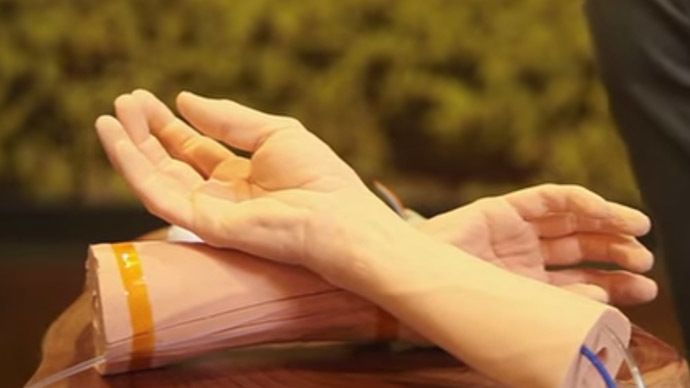Google creates synthetic skin for cancer detecting project (VIDEO)

Google’s clandestine cutting-edge health research facility has created synthetic human skin as part of its innovative cancer detecting project that aims to prevent the disease before it develops, US media has revealed.
Google X laboratories, located in Mountain View, California, has been working on a wristband that can detect cancer cells and warn of impending heart attacks and other diseases transmitted through a person’s blood. The Atlantic visited the semi-secretive research center, which employs more than 100 doctors and scientists, and asked its head why Google is making human skin.
The project is still in its infancy, said Andrew Conrad, head of Google Life Sciences. However, scientists are hopeful they will “change medicine from being episodic and reactive, like going to the doctor saying ‘my arm hurts,' to being proactive and preventative.”
He explained that in order to find cancer cells, the technology would use disease-detecting nanoparticles, ingested via a pill, that send data back to a sensor on a wristband. The “light up” cells make their way underneath the detector which, like a magnet, attracts the nanoparticles.
“We have [the nanoparticles] circulate around your whole body looking for those cells and we collect them using a magnet and basically ask them what they saw,” Conrad said.
READ MORE : Google nanobots: Early warning system for cancer, heart disease inside the body
The head of research explained that these nanoparticles with cancer cells will “light up.” In order to catch the light, scientists need to study how it passes through the skin. Thus, Google started making “practice arms” with synthetic skin and real human skin from donors.
“When they were casting and making these arms they had to make them from materials that behave like skin, have the same autofluresence and biochemical components of real arms,” Conrad said.
Google is also constantly monitoring 175 healthy volunteers with a goal to understand what defines a healthy person.
Among the tech giant's other innovative projects are: a tremor-canceling spoon for Parkinson's patients, contact lenses with micro cameras, Project Loon – a balloon-powered internet, driverless cars, and delivery drones.












